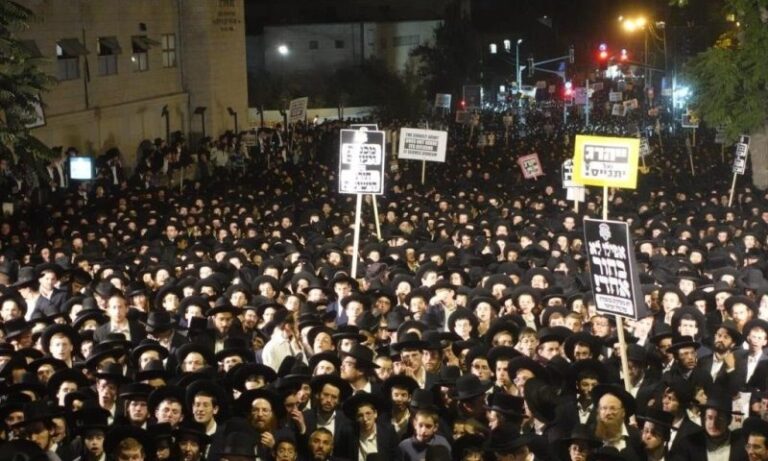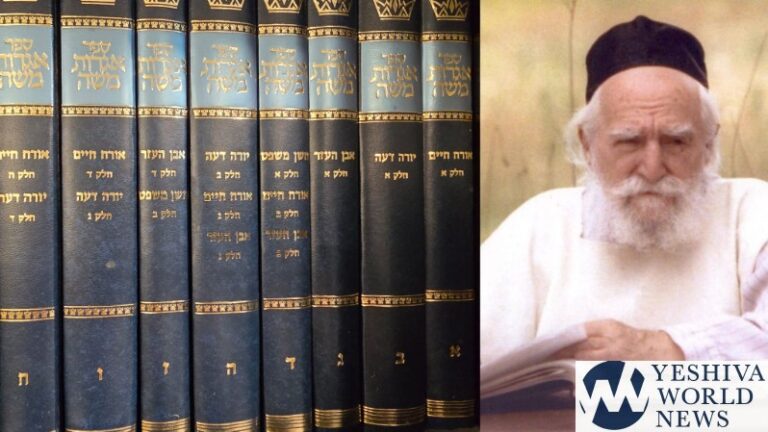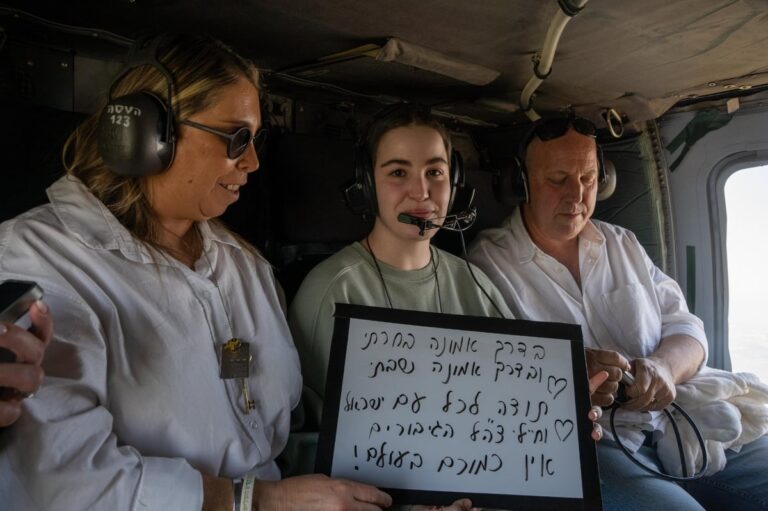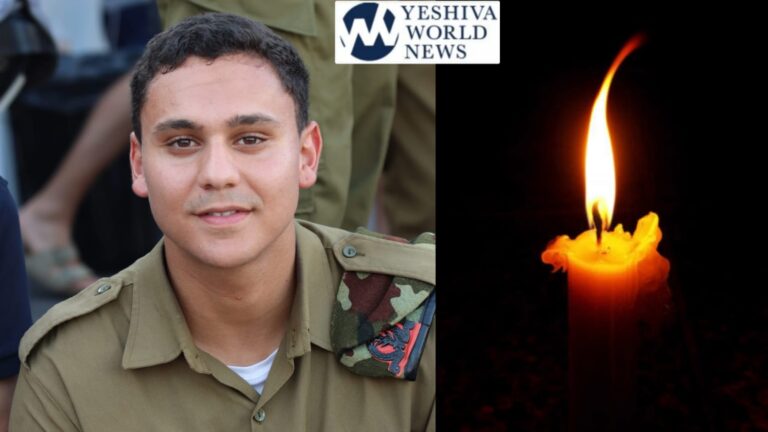
PHOTO LINK BELOW: The Thursday night plenary session at Agudath Israel of America’s 87th national Convention, the first of the four-day gathering at the East Brunswick Hilton – a new location for the convention – was attended by an impressive crowd that filled the large hall. And it heard an important message: Honesty in business and in personal life is the mandate of every Jew.
Rabbi Yaakov Perlow, the Novominsker Rebbe and Rosh Agudas Yisroel, was the first of the evening’s speakers to address the session, which was entitled, “Yisroel Asher Becho Espo’or: Promoting K’vod Shomayim in Our Business and Interpersonal Dealings.”
He focused on a number of issues and ideas pertinent to that theme, which, in light of events both past and present, he called a “painful subject.” Noting the increased number of tragedies in the community over recent years and months, the Rebbe exhorted his listeners to introspect in light of the yesurim around them. We must not, he said, attribute sad circumstances to chance or nature but rather recognize that they demand
change of us – and that a “cloud” of chilul Hashem, the “most grave of all transgressions… hangs over us.”
The Rebbe went on to suggest that the teshuva for chilul Hashem is kiddush Hashem – that the latter is what alone can “fill up” the void – the “cholol” that defines “chilul” both etymologically and in reality – caused by actions in Klal Yisroel that bring defamation to Sheim Hashem. And so he told his listeners to seek – “every day and every person” – opportunities to be marbeh kvod Shomayim and cause the name of Hashem to be mis’ahev al yodecha – to become beloved through our actions.
After Rabbi Perlow’s address, an audio-visual presentation brought the words of two Gedolim in the Olam Ho’emes on the same topic to the gathering: Rav Shimon Schwab and Rav Avrohom Pam zecher tzaddikim liv’rocho.
Rav Schwab, who served as Rav of Khal Adath Jeshurun and the Washington Heights community for nearly four decades, addressed an Agudath Israel “Halacha Conference for Accountants” on 18 Shevat, 5749 (January 24, 1989). Excerpts of that address, in which Rav Schwab minced no words about the wrongness of “cutting corners” when it came to honesty in business, were screened for the gathering.
The presentation then continued with words of Rav Pam, who served as Rosh HaYeshiva of Yeshiva Torah Vodaas (where he taught for more than 60 years) and was a Chaver of the Moetzes Gedolei HaTorah. On 24 Cheshvan, 5761 (November 22, 2000), he was recorded on film addressing the issue of honesty. The film was screened the next day at that year’s Agudath Israel convention. Excerpts of that moving speech, which constituted one of his last public appearances, comprised the second part of the audio-visual presentation. The anguish in Rav Pam’s face and words were clearly the product not of his illness at the time but of the pain he felt at having to address the issue of honesty, one that, he said, is so essential a part of what it means to be a good Jew.
After the video presentation, Rabbi Matisyahu Salomon, Mashgiach, Bais Medrash Govoha, ascended to the podium to deliver his message to the gathering. He focused on the fact that each day, whether we sufficiently realize it or not, we ask Hashem for chances to be mekadesh Sheim Shomayim. That, the Mashgiach explained, is the meaning of the Kedusha, which is a prayer, not a praise – a prayer that we be able to be mekadesh
es shimcho bo’olam.
Kvod Shomayim, Rabbi Salomon averred, is the purpose of Creation, and the purpose of our lives. And, quoting the Novi Yeshayohu, the Mashgiach explained how the “she’eiris Yisroel” that will merit the arrival of Moshiach is described as Jews who, in the Novi’s words, “do not engage in dishonest behavior, do not speak falsely and whose mouths contain no language of misleading.” That, said the Mashgiach, is because Moshiach’s
arrival is to usher into the world unprecedented Kiddush Hashem, to bring the nations of the world to recognize the specialness of Klal Yisroel. Were he to come, though, at a time when Jews are spoken of as behaving badly in the marketplace, the reaction would be “What? He has come for those swindlers!” That would be a chilul, not kiddush, Hashem.
“Hashem will only bring Moshiach,” Rabbi Salomon exclaimed, “when it will be a kiddush Hashem!” “Let us,” he continued, make that a reality.
The evening session’s chairman was Chaim Leshkowitz, member, Agudath Israel Board of Trustees.
Earlier in the Thursday night program, an audio-visual presentation entitled “Agudath Israel: Responding to the Needs of Klal Yisroel and Reb Yisroel,” was screened. It included a sampling of the kind of work Agudath Israel’s divisions do, and featured a number of individuals who spoke about how they were personally helped by the organization’s efforts.
The convention opened several hours before the plenary session commenced, with concurrent sessions offered over the course of the afternoon. Among the issues addressed by panels at those sessions and discussed by those who attended them were the persistent and ever-growing dangers posed by the internet and other electronic media (in a session entitled “Tangled Up in the Web: Real Problems, Real Solutions”); the search for new and innovative ways to help singles find their mates (“Thinking Outside the
Shidduch Box: New Approaches to an Old Problem”); and the imperative to preserve the memories – and the lessons-of the Holocaust for our children (Seventy Years Later: “The Need to Keep Churban Europe Before the Eyes of Our Young”).
YWN PHOTO LINK: Click HERE for photos taken by Hillel Engel for YWN at the Thursday sessions.
NOTE: Photos & articles will be updated throughout the convention.
(YWN World Headquarters – NYC)











8 Responses
The real cloud that hangs over us, is our inner disrespect and non-caring for the well being of any Umos Ho’olom.
Even if we thing that the Umos Ho’olom don’t realize it, we should know that HKB”H hears and realizes everything.
HKB”H hears all the derogatory words and thoughts, against the Umos Ho’olom. These demeaning words and phrases are constantly utilized by us and by our children in Yeshiva.
Hashem should help that we should be Zoche to do Teshuvah before it’s to late. The Klausenberger Rebbeh said that after 1939, the Gezeiru was sealed and it was to late to do Teshuvah, R”L.
I have recently begun saying a short tefilla,prior to engaging in business activities,requesting that
only a kiddush hashem should come from it.This has brought much hatzlocha.
Whats missing in this article is the number of people in attendence. How many people actually go to this convention? Who goes?
Any way to hear a recording of the speeches?
Gut Voch to all! #2 seeking truth, is it please possible to share the short tefillah that you say! Thank you and may we all be zocher for a early geulah ve yeshuah, with all the cholim having a complete refuah shelayma be karov!
#1 – Whether this is the main cause of the cloud over us or not, you still identified a very, very serious problem that we suffer from and that is rarely spoken about. You are 100% correct in that this is wrong.
We seem to forget that Adam, Noach, the first Roshei Yeshivah Shem & Ever were all non-Jews. They were all “Goyim”. We forget that all of mankind were created B’tzelem Elokim, all of mankind were and are given neshomos. We forget that our purpose is to be Hashem’s Am Segulah and a light onto the nations of the world. In other words, we are the Rabbaim and they are our Talmidim (by example only, no direct teaching requested). What kind of Rabbaim are we if we openly despise our Talmidim? We fail to realize that tzadikim can and do come from the umos ha’olam. They deserve our respect, our acceptance of them as fellow members of neshama bearers created b-tzelem Elokim. They too have the sheva mitzvos bnai Noach and they too can achieve a Kiddush Hashem, in their own way. All of this is poshut, yet it is my impression that most Bnai Torah view these comments as apikorsus.
Dr D, your assumption that “all of mankind were created B’tzelem Elokim” is wrong. The mishna in Avos (3:14) clearly says:
1. חביב אדם שנברא בצלם
2. חביבין ישראל שנקראו בנים למקום
3. חביבין ישראל שניתן להם כלי חמדה
It is a direct connection. True, Odom (the father of all mankind) was called “tzelem”, but that midah was bequeathed to Yisroel, and furthermore only to those amongst Yisroel who have accepted the Torah.
Anyone who has not been filtered down these three steps has not earned (or retained) his/her Tzelem Elokim.
Don’t believe me? Look around. Are there any non Shomer Torah & Mitzvos Jews who don’t have a TV, or don’t go to movies, or don’t visit terrible websites? By doing these actions, they have relinquished their Tzelem Elokim. “אלוקיהם של אלו שונא זימה” (The G-d of the Jews hates immorality).
#8 & #9- L’ma’an Ha’Emes V’Ha’Shalom, I feel compelled to share I believe that “Alu V’Alu, etc.”- both of you are correct. As per the Tiferes Yisroel (T”Y), “Adam” in the Ma’amar “Chaviv Adam She’nivra B’Tzelem” indeed refers to the Umos Ha’Olam/Akum (beyond Adam HaRishon). Albeit, members of the nations can lose their Tzelem Elokim through engaging in Rish’us (while Bnai Yisroel cannot), as per the T”Y, there is no a priori reason to believe that this is their default status, even in today’s morally depraved world. In the course of seeking my livelihood I have met a number of Bnai Noach with enviable Midos Tovos. I can only conclude that these individuals have actively refined their innate Tzelem Elokim.